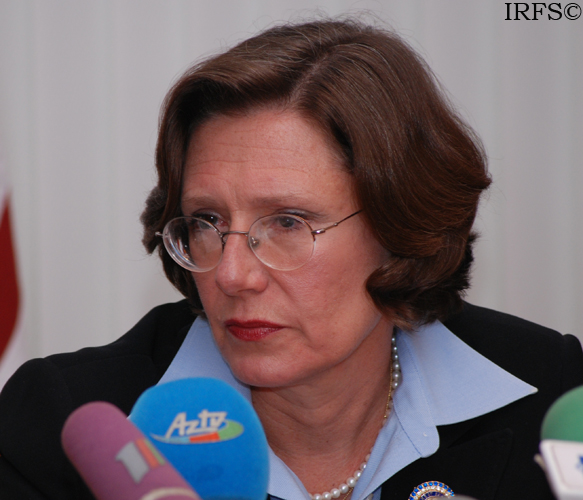 By Anne E. Derse, U.S. Ambassador to Azerbaijan
By Anne E. Derse, U.S. Ambassador to AzerbaijanThere was good news regarding press freedom in Azerbaijan last week.
We welcomed the news of Azadliq journalist Mirza Sakit's release from prison. On the same day, we welcomed the reversal of Asif Marzili's prison sentence, which had been issued two days earlier as punishment for libel.
These positive developments recall a concept that everyone who believes in democracy can agree on: journalists should not be jailed for their writings.
Democracies thrive when ideas are openly debated within society. Whether in the pages of newspapers, on radio news talk shows, internet chat rooms or free speech zones of public parks, democratic societies require space for the vigorous exchange of ideas.
Democracies thrive when ideas are openly debated within society. Whether in the pages of newspapers, on radio news talk shows, internet chat rooms or free speech zones of public parks, democratic societies require space for the vigorous exchange of ideas.
To ensure this free space within the media, we have long advocated for changes in the libel laws here and elsewhere around the world. No matter how disturbing or uncomfortable free speech may be to some, it should never be a criminal offense. As long as journalists work under the threat of being thrown into jail for their writings, their free speech rights – and every citizen’s free speech rights — are limited. Without free speech — which allows the free exchange of ideas — freedom itself is limited.
I welcomed President Aliyev's comments, as relayed by Ali Hasanov to the press, on this matter. His statements in support of pluralism and on the need to find better ways to resolve conflicts between journalists and aggrieved parties were very welcome.
Given their critical role in preserving freedom in a democracy, journalists, of course, must be responsible. In their important work ensuring the people’s right to be informed and government accountability, journalists must follow ethical codes and professional norms, and they must follow the laws that every citizen must follow. But journalists who violate ethical codes and professional norms in their writings should face civil actions and rejection by their peers and the public, not imprisonment. They should be tried in the "court of public opinion". We find in the United States that the public knows the difference between credible journalism and silliness, between valuable investigative reporting and malicious gossip. Great journalists doing serious work have a huge impact and are heroes. Those who write titillating or malicious gossip are dismissed by the public as clowns. In a very real way, in the United States, we encourage a free market of ideas — and we have found that the free market works.
One principle that is at the core of our thinking about libel and free speech is the idea of the "public figure," meaning in most cases government officials and elected representatives. As Americans, we feel strongly that the government answers to the people, and the media — what we like to call the Fourth Estate — has a special role in ensuring that the government does, indeed, answer to the people.
We believe that when an individual seeks public office, he or she essentially agrees to a level of public scrutiny, questioning and criticism that is fundamentally different than anything expected of "private" citizens. Since the New York Times Co. v Sullivan Supreme Court ruling 45 years ago, U.S. courts have set a very high bar for public officials to surpass if they choose to sue reporters for libel or slander. They must prove not only that the facts are false, they must also prove that the reporter exercised reckless disregard of the truth — had actual malice — in publishing the information.
As a result, it is very rare for public officials to bring libel cases against the media in the United States. And of those rare cases, almost none succeed.
The Supreme Court decided that in the interest of good government — in the interest of the people's right to know how public policy is developed and implemented, and how public money is spent – journalists should be given very free rein.
There are, of course, some local and national officials who feel unprotected by these standards. They complain they are unjustly criticized, ridiculed and embarrassed by the media. Americans, nonetheless, see the public official standard as a crucial element of open government. Unless the press has the space to vigorously and responsibly investigate, criticize and, yes, even make mistakes, the balance of power between the government and the governed is skewed.
Giving journalists the protection to focus on public officials has served America well by ensuring the accountability of those who we, the people, have entrusted with the powers of government. From small towns to Washington DC, journalists have revealed mismanagement, corruption, and misspending of public funds. And our elected representatives and public servants, while sometimes finding the questioning uncomfortable or intrusive, see the media as an essential element in public policymaking. There is a natural tension between media and the government — you could call it a healthy skepticism — but that tension is key for public oversight.
In the most professionally managed cities and states of America, you find strong newspapers and TV news operations. Where the best journalism is practiced, you find citizens who are connected and involved with the government.
Of course, in Azerbaijan, how Azerbaijan will deal with these issues is a decision for Azerbaijanis to make as the country moves forward in its democratic development. We just hope that journalists will be provided the protections and space they need to contribute to that democratic development.

